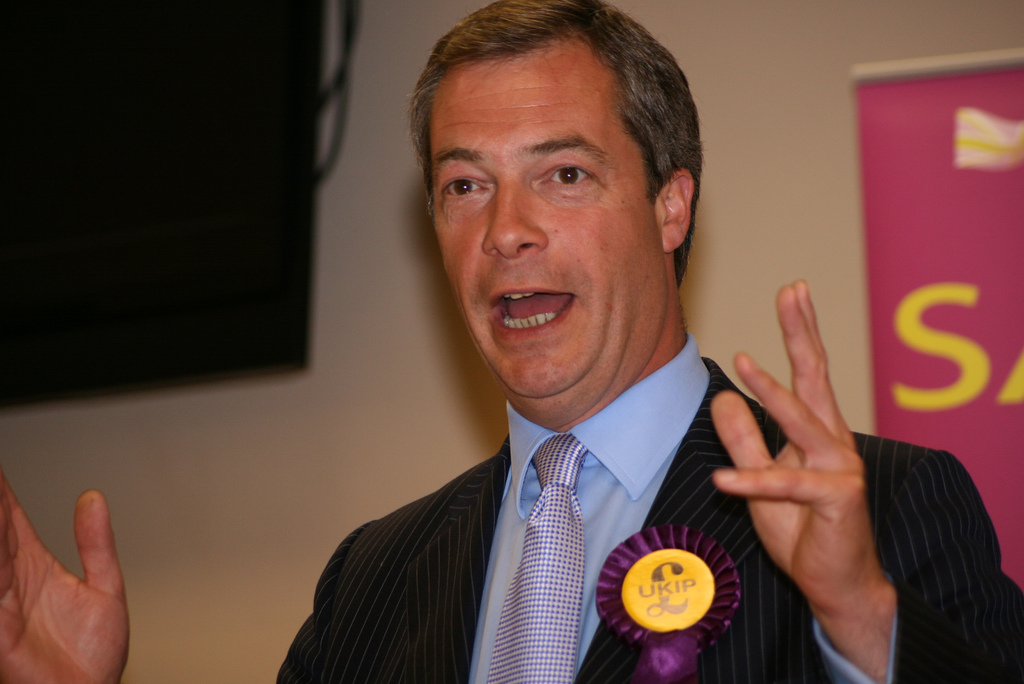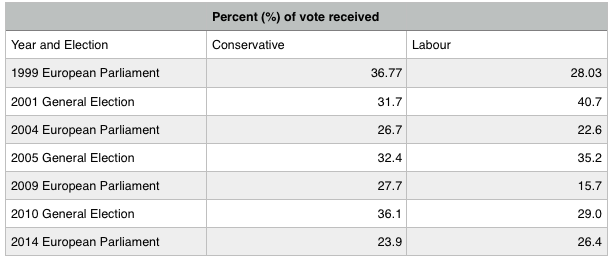Analysis: What does UKIP’s election victory mean for 2015?
Nigel Farage’s promise of a “political earthquake” has been felt across the United Kingdom as the results of the European Parliament elections were announced.

For years UKIP had been making minor tremors in local elections and slightly stronger ones in Europe, but Nigel Farage’s party has now stormed to victory displacing the Conservatives as the leading party representing the UK in the European Parliament. Last year, the talk of UKIP upsetting the status quo seemed nothing more than just fantasy, but UKIP’s undisputed win has made the prospect of a third major party in British politics very much a reality.
UKIP’s win marked the first time a party other than the Conservatives or Labour had topped a national election in 108 years. They’ve come close before in the 2009 European Parliament elections — UKIP gained 13 seats levelling with the Labour party in second place and marginally beating them with a higher percentage of the vote. In this year’s elections they have increased that number by 11 MEPs totalling 27.49% of the vote as the Conservatives fall to third place losing 7 MEPs. The loss of seats in European Parliament elections the year before a general election is not uncommon for the party in power at Whitehall and they are usually beaten, but never by the outsiders. The Conservatives beat Tony Blair’s Labour party in the 1999 and 2004 European Parliament elections before finishing second in the 2001 and 2005 general elections. Labour marginally edged ahead of the Conservative party in 2009 before the 2010 general election that subsequently lead to the formation of the current Conservative and Liberal Democrat coalition. UKIP’s win presents a very real threat to the Conservatives and Labour that they can no longer ignore if either one of these parties wishes to form a majority government at the 2015 general election.

These statistics suggest that despite Labour’s victory over the Conservatives in the 2014 European Parliament elections, they will not beat them in the 2015 general election. Labour have recovered from bigger deficits before to claim victory in the general election and so there is sufficient evidence to suggest the Conservatives will too. However, the Conservatives will not be relying on this trend to continue, especially as they were unable to claim a simple majority at the 2010 general election despite their 12% lead over Labour at the 2009 European Parliament election. And now with the added problem of UKIP to shake off, the Conservatives will have to launch a strong campaign to win back voters if they are to be elected for another term.
This will be easier said than done as UKIP do not look like they are going away.
A ComRes poll states that 86% of UKIP’s 4.3 million voters will continue to back the party in 2015 with 37% of them claiming they are “certain” they will vote UKIP again.
Turnout in the UK was higher than in 2009 reaching 36%, 7% short of the EU average. This upward trend can be correlated to UKIP’s rise in prominence as they take a hardline stance on immigration and the UK’s relationship with the EU. It is now clear that the repeated attempts to cast UKIP off as a party full of racists has not been a big enough deterrent and they have been too quickly disregarded as sensationalists. The British public have voted for them and in numbers too. It would surely be too naive of the two major parties in the UK to simply state UKIP’s rise is a protest vote against the Coalition. It is also worth noting that the Liberal Democrats took the biggest hit as they lost all but one of their 11 MEPs, placing fifth behind the Green party. This is surely more than a reactionary knee jerk from displeased voters.
It is highly unlikely that UKIP will sweep to power and form a majority government in 2015 as their votes are still rather displaced. Concentrated votes matter at general elections in the UK due to the nature of the first past the past voting system, which is contrasted by the European Union’s enforced system of proportional representation. UKIP won seats in all English constituencies and for the first time reached Scotland too. Their voters are still quite sparse and they have a lot of work to do in areas like London where they were not so well received taking just 16.9%, compared to Labour’s 36.7% and the Conservatives 22.5%. Progress, none the less, and Nigel Farage’s party will hope they can go from strength to strength to achieve their goal. UKIP are now a prospect that must be taken seriously and they will surely have some impact on next year’s general election in some form.
by Andrew McClean
@drewmcclean





















